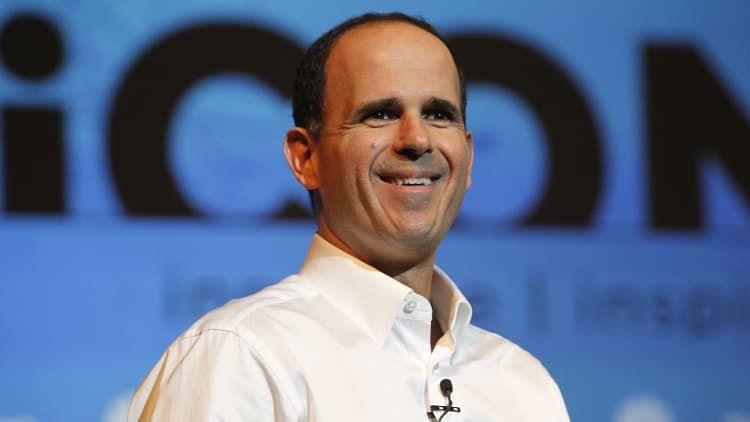In this week's episode of CNBC's "The Profit," self-made millionaire Marcus Lemonis gave some crucial advice to two entrepreneurs struggling to keep their company successful, which can help any employee succeed: "Allow your creativity to breathe."
Lemonis told Eric Yelsma and Brenna Lane, the owners of the high-end jean manufacturer Detroit Denim, that upon his first assessment, he had reservations about investing in the company because he thought the owners were as "stiff" as the jeans they sold.
Detroit Denim was founded by Yelsma in 2010 when he became "tired of the corporate rat race" and saw the opportunity to revitalize his city by tapping into local designers and fabricators.
Even after Detroit became the largest U.S. city to file for bankruptcy, Detroit Denim's business slowly grew, reaching a quarter of a million dollars in revenue in 2016. All of the pieces sold in Yelsma's store are sourced from the United States and made in Detroit.
Lemonis, who has invested over $15 million in the fashion business in the last several years, has monitored the manufacturing business in Detroit and felt confident that Detroit Denim "could be huge." But the biggest obstacle Lemonis found had kept the jean makers from pocketing bigger profits and growing store and online sales was the Detroit Denim team itself.
"If [Eric] is ultimately going to be the leader of this business, he needs to motivate his people and how to listen to them, especially their ideas," Lemonis said.
Lemonis provided these other pieces of advice to Detroit Denim that anyone can use to boost his or her success.
Be open to others' ideas
When Lemonis first arrived at the business, Yelsma made it clear that he only sold men's jeans and never wanted to — nor planned to — sell women's jeans.
Lane, Yelsma's co-owner, partner and production manager, said launching a line of women's jeans was a natural next step, but Yelsma ultimately made the final calls.
"Eric doesn't have fun or enjoy any process or any idea that is outside of his framework," Lemonis said.
Upon speaking with other employees, Lemonis noticed how they also had ideas to branch into womenswear and accessories aside from jeans.
"Eric seems alarmingly rigid about that way he runs his business and the fact that other people have creative products and he's not even willing to offer them, he's constricting, strangling, the ability for the business to grow," Lemonis said.
Instead, he was blunt and honest with what he thought the team should do.
"I think everyone needs to lighten up," Lemonis said. "It's denim, it's supposed to be fun.'
Remind yourself and others of your motivation
"Growing up, I just had this curiosity with jeans and how things get made and it's got a fun history," Yelsma said. "When you think of blue jeans, you think America."
Yelsma said that when he started Detroit Denim, his idea was to make a pair of jeans in the way that he would personally want to buy them. But Yelsma also had a socioeconomic motivation as well.
"Each thing we do brings a new opportunity into a pretty devastating area," Yelsma said about his company. "It's about hiring and training Detroiters."
Lemonis noted that Yelsma's rigid approach to his business was not only for the sake of running a tight ship, but also tied to the mission he started his company with.
"My initial thoughts were that Eric is all about himself, but the more I talk with him, I learned his real motivation is to be a part of the rebuilding of Detroit," Lemonis said. "That's the motivation I need to be able to push things forward."
'Allow creativity to breathe'
Out of the $325,000 Lemonis invested into Detroit Denim, he set apart $50,000 specifically for research and development in the creation of new products, buying textiles and trying new things to turn the new products "into real, high-margin moneymakers."
"I think we have to work collectively with the team to allow the creativity to breathe," Lemonis said.
With his years of experience, Lemonis held tightly to the idea that Detroit Denim would not survive as a men's denim jean company.
"We need to fill this floor with people that can bring ideas that we don't have today. We're going to need to understand what the assortment is for the company," Lemonis said. "We will continue to make jeans, but I don't believe that if you're in the apparel business you should make things just for guys, because that's not where the meat of the market is."
When Lemonis first met Marguerite, a production stitcher at Detroit Denim, she told Lemonis "fashion is a bad word around here."
Lemonis took Yelsma, Lane and Marguerite to a local thrift shop to select items they could refashion and create one-of-a-kind pieces. The goal was to expand creativity and sell them at "explosive margins."
He further emphasized that he's looking for creativity and the willingness to take a chance.
After thrifting, they returned to Detroit Denim's production floor, where Lemonis wanted the team to be creative and have a fun free-for-all while refashioning their vintage items. He encouraged the team to break away from their usual process and worked with Yelsma on "getting comfortable and just letting other people do things."
Lemonis also reminded Lane, who he noticed overthinks all her processes, to enjoy herself and not take herself so seriously.
"We're not ever doing this because we wanted some easy road, we're going to embrace this challenge," Lane said. "It's not easy, but it's worth it."
Like this story? Like CNBC Make It on Facebook.
Don't miss:
Billionaire Richard Branson says this visual trick will help you reach your biggest goals
Warren Buffett, Bill Gates, Jay-Z and 3 other highly successful people share their best parenting advice






